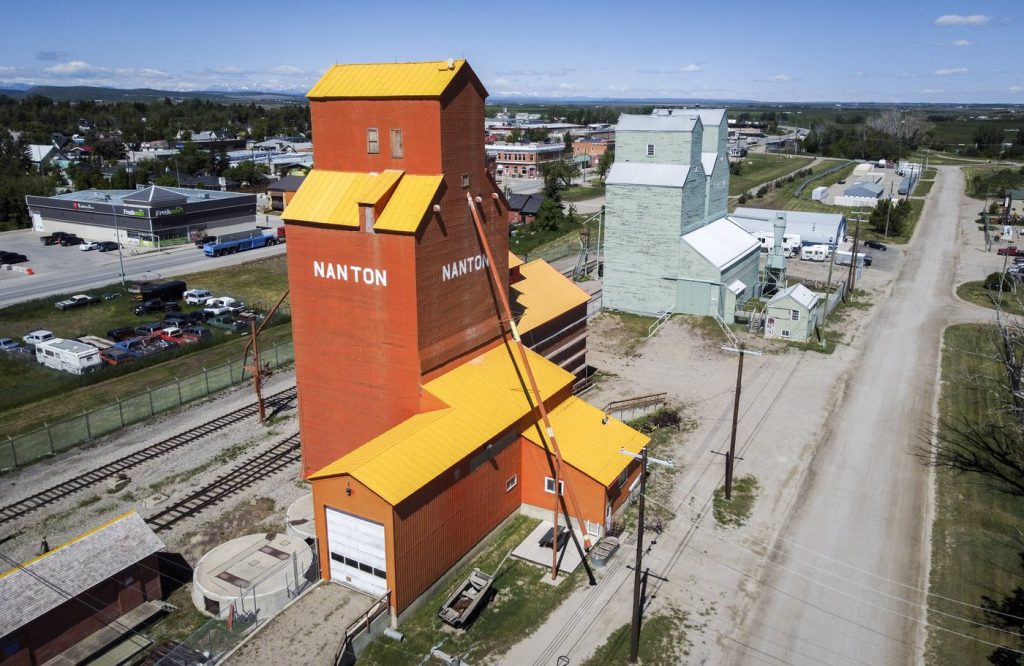‘Bulldozing our history’: Alberta man working to restore town’s grain elevators

Posted Jun 23, 2024 6:00 am.
Last Updated Jun 23, 2024 7:40 am.
When Leo Wieser worked in the movie biz, he built a million-dollar swimming pool that was used for one day.
Now he’s fighting to raise at least that much, entering contests, running raffles and hosting movie nights, to preserve two 21-metre icons of the Prairies – twin grain elevators in Nanton, Alta.
“These were the beacons. These were the things from the 1910s and 1920s that were actually landmarks,” said Wieser.
“You’re going to go in the office (there), you’re going to talk about world and current events, you’re going to talk about the gossip, the chin wagging, alcohol imbibing, the games of cribbage.
“All of this made it a social network of its time that we’re never going to experience again.”
Wieser is president of the Canadian Grain Elevator Discovery Centre in Nanton, 80 kilometres south of Calgary.
He grew up in Calgary next door to Heritage Park. There, visitors experience Canadian history from the 1860s to the 1950s through exhibits and chatting with costumed interpreters at the general store, the coal mine water wheel, the railway, the blacksmith shop and the grain elevator.
“I would always be playing there and not really thinking about it,” said Wieser.
“As I got older, I started realizing all these things I took for granted, all this history, was getting bulldozed or knocked down and was just not valued at all.”
Wieser went on to earn a master’s degree in scenic design and stage directing and worked 30 years conjuring up special effects for movies and TV: “Prey,” “K-19: The Widowmaker,” “Shanghai Knights,” “Heartland,” “Jann” and “Wynonna Earp.”
Restoring the Nanton elevators, he said, is a lot like staging a production.
“I look at this as a show. We’re going to put on a show — give them an impression of history, of space, of a place in time.”
He has his work cut out for him.
The elevators, each big enough to hold about 40,000 bushels of grain, are approaching 100 years old. The weathered wooden structures, designated provincial historical resources, are structurally sound but feeling their age.
Wieser recently entered the elevators in the national “Next Great Save” contest. Run by the National Trust for Canada, the contest awards prizes for preserving history.
The elevators finished third, winning $5,000. It helps, said Wieser, but it’s a drop in the bucket.
He’s hunting for other grants, approaching family foundations and running raffles. He hosts movie nights, showing films on the side of the elevators, and passes the hat afterward.
“Just for the restoration – not even to do anything too special — we’re probably looking for about a million dollars,” he said.
The goal is preserving a small reminder of the towering sentinels that were linked by railways and defined hamlets, villages and towns.
The number of elevators has declined drastically, from 5,700 in the 1930s to less than 100 today.
“We lose about five a year across Western Canada,” Wieser said.
“We lose our values, we lose what put us here.”
He sees the returns of keeping history alive in his current “hobby job,” driving a steam locomotive at Heritage Park.
“We’re under full steam and we’re chugging away, and (in front of us is) the front entrance to the gate,” he said.
“The kids and adults look at the engine chugging towards them — and the smile and the look on their faces is so incredible.”








